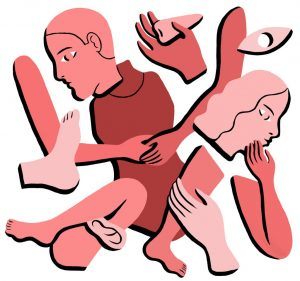Ramona Ausubel in The New York Times:
 In the 12 wide-ranging stories of her latest collection, “Days of Awe,” A. M. Homes skillfully circles and tugs at the question of what it means to live in flawed, fragile, hungry human bodies. One character embeds rose thorns in her feet; several have very disordered eating habits; people die too young, go to war and hold in their cells and minds the memories of past trauma. The title story is about a war reporter and a novelist who meet at a conference on genocide and have a weekend affair. Here the body is death — the millions killed who haunt the conference attendees — but it’s also desire. The affair is vivid and real and yet there is a shard of violence in it, the everyday violence of two people using each other to counter pain they don’t know how to digest.
In the 12 wide-ranging stories of her latest collection, “Days of Awe,” A. M. Homes skillfully circles and tugs at the question of what it means to live in flawed, fragile, hungry human bodies. One character embeds rose thorns in her feet; several have very disordered eating habits; people die too young, go to war and hold in their cells and minds the memories of past trauma. The title story is about a war reporter and a novelist who meet at a conference on genocide and have a weekend affair. Here the body is death — the millions killed who haunt the conference attendees — but it’s also desire. The affair is vivid and real and yet there is a shard of violence in it, the everyday violence of two people using each other to counter pain they don’t know how to digest.
Of a plastic surgeon in “Brother on Sunday,” Homes writes, “He thinks about Botox and Restylane and lasering spider veins and resurfacing a face, and sometimes he feels like a conservator, like the guy he once sat next to at a dinner who worked at the Met, touching up artworks when they chipped or when the ceiling leaked on them.” The possibility of profound beauty presses from one direction; the certainty of imperfection, of shame, presses from the other. Between these forces, the characters are hardened, sometimes into coal, sometimes into diamonds. But Homes, the author of 11 other books, including the best-selling memoir “The Mistress’s Daughter” and the Baileys Women’s Prize-winning novel “May We Be Forgiven,” is interested in more than beauty or ugliness: She writes about the interaction between inner lives and outer lives and our attempts to be seen or to hide. In “Hello Everybody,” Homes writes of two teenagers: “They are forever marking and unmarking their bodies, as though it were entirely natural to write on them and equally natural to erase any desecration or signs of wear, like scribbling notes to oneself on the palm of the hand. They are making their bodies their own — renovating,
More here.
